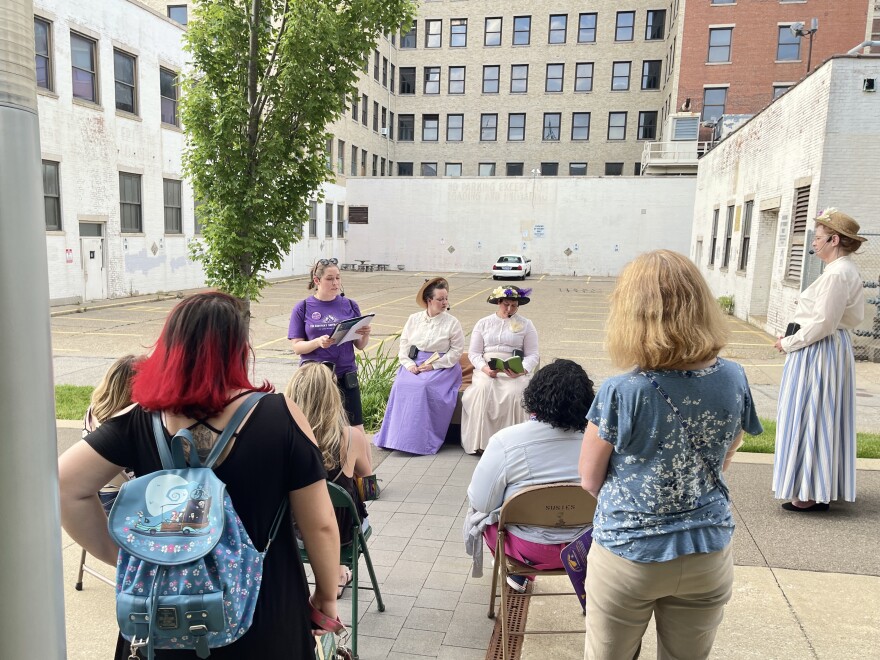A new show running this weekend takes audiences to different sites in Louisville that have ties to the women’s suffrage movement.
Looking for Lilith Theatre Company’s “From Bardstown to Broadway: The Suffrage Driving & Walking Tour” gives viewers glimpses into the lives of Louisville women who played a role in the fight for women’s voting rights.
Scenes are set at various sites around town, each with its own historical significance, and audience members can either drive or walk from site-to-site.
It’s part of The Kentucky Suffrage Project, the company’s larger look at the 19th Amendment, which gave some women the right to vote when it was ratified in 1920.
Jennifer Thalman Kepler, Looking for Lilith co-artistic director and devising and production director for the tour, said they originally planned the show as a staged play to run in August 2020, marking the centennial of the ratification.
But, due to the pandemic, the creative team changed course: first to video, with 20-minute episodes the company released on YouTube and Facebook, and then to the tour concept.
https://www.youtube.com/watch?v=SB72B_uK_tw
“We developed the idea of this driving and walking tour to take some of the scenes that we've created, and perform them in locations where the women actually lived or worked,” Thalman Kepler said.
The production is years in the making, stemming from the initial plan to find a way to commemorate that major anniversary.
Looking for Lilith’s mission is to “lift up underheard or undertold stories,” Thalman Kepler said. The movement itself didn’t necessarily fit that description, but Thalman Kepler and her colleagues felt that there were likely lesser-known narratives about women in Kentuckiana, and more specifically Louisville, fighting for their right to vote.
They worked with researchers from institutions such as the University of Louisville and the library at the University of Kentucky to pull together the stories of these women.
Thalman Kepler said it was key to not gloss over the “gaps” in retelling the history of women’s suffrage.
“Different white women within the movement had different points of view on universal suffrage, which was the term used to describe all women: Black, white or of any ethnic background, being able to vote,” she said.
Research also shows that racism, for a number of suffragists, was ingrained in their approach.
“It was important to us to explore that and to really lean into what we would see now as really problematic aspects of the movement and to not pretend that it was something that wasn't,” Thalman Kepler said.
And the 19th Amendment, upon ratification, did not automatically grant all women the right to vote.
The amendment said U.S. citizens cannot be “denied” the right to vote “on account of sex.” But many women still faced discrimination at the ballot box, including discrimination on the basis of race. Their voting rights wouldn’t be protected until decades later with the passage of the 1965 Voting Rights Act.
Yet Black suffragists and women of color played a major role in getting the 19th Amendment passed. Thalman Kepler said they’ve included several “very strong and very involved African-American women in Louisville” on these tours.
While they missed the mark of the centennial last summer, Thalman Kepler said the issue of voting rights, and the “history of that struggle,” feels just as relevant today.
“We certainly feel as though exploring the history of voting rights in this country is really important, especially for people for whom that has not been a concern, to understand why voting rights are important and why people have fought for a very long time,” she said.
The production opened last month, and the next tours are slated for Friday through Sunday. There will be another weekend of performances Aug. 27 - 29. Tours meet at the Louisville Free Public Library Main Branch. Tickets are pay-what-you-can. Looking for Lilith has more information about accessibility issues at its website.



